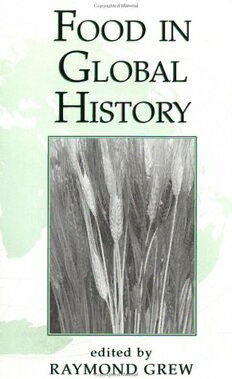Download Food in global history PDF Free - Full Version
Download Food in global history by Raymond Grew in PDF format completely FREE. No registration required, no payment needed. Get instant access to this valuable resource on PDFdrive.to!
About Food in global history
Social scientists have studied foods in many different ways. Historians have most often studied the history of specific foods, and anthropologists have emphasized the role of food in religious rituals and group identities. Sociologists have looked primarily at food as an indicator of social class and a factor in social ties, and nutritionists have focused on changing patterns of consumption and applied medical knowledge to study the effects of diet on public health. Some scholars from these and other disciplines have studied the economic and political connections created around commerce in food, regionally and around the world. Now, all of these perspectives are brought together in a single volume. Fifteen specialists currently working in Canada, England, France, Guatemala, Norway, and the United States come together to apply their expert knowledge of food and food consumption in a new context, global history. In general essays and case studies, they reflect on the connections across space and time in what people eat and assess historical patterns of change in the human diet.The book begins with a consideration of the relationship between food and global history. Part One considers the global history of the ecology of food production, the contrasting impact of New World foods on India and China, the effects of global tourism, and the interaction between identity, migration, and diet. The selections in Part Two study the impact of public policy, comparing the countries of the former Soviet bloc with Scandinavia and Western Europe, analyzing the effects of international assistance on West Africa, and looking at changes in childhood nutrition in developing countries. Chapters in Part Three study nutritional change, the dietary effects of increased wealth, and the ”Mad Cow” crisis in terms of global systems. Part Four investigates the relationship of global change to the ideologies and practices of the family meal, of food and cultural identity in Japan, and the American counterculture.
Detailed Information
| Author: | Raymond Grew |
|---|---|
| Publication Year: | 1999 |
| ISBN: | 9780813338842 |
| Pages: | 304 |
| Language: | English |
| File Size: | 49.891 |
| Format: | |
| Price: | FREE |
Safe & Secure Download - No registration required
Why Choose PDFdrive for Your Free Food in global history Download?
- 100% Free: No hidden fees or subscriptions required for one book every day.
- No Registration: Immediate access is available without creating accounts for one book every day.
- Safe and Secure: Clean downloads without malware or viruses
- Multiple Formats: PDF, MOBI, Mpub,... optimized for all devices
- Educational Resource: Supporting knowledge sharing and learning
Frequently Asked Questions
Is it really free to download Food in global history PDF?
Yes, on https://PDFdrive.to you can download Food in global history by Raymond Grew completely free. We don't require any payment, subscription, or registration to access this PDF file. For 3 books every day.
How can I read Food in global history on my mobile device?
After downloading Food in global history PDF, you can open it with any PDF reader app on your phone or tablet. We recommend using Adobe Acrobat Reader, Apple Books, or Google Play Books for the best reading experience.
Is this the full version of Food in global history?
Yes, this is the complete PDF version of Food in global history by Raymond Grew. You will be able to read the entire content as in the printed version without missing any pages.
Is it legal to download Food in global history PDF for free?
https://PDFdrive.to provides links to free educational resources available online. We do not store any files on our servers. Please be aware of copyright laws in your country before downloading.
The materials shared are intended for research, educational, and personal use in accordance with fair use principles.

